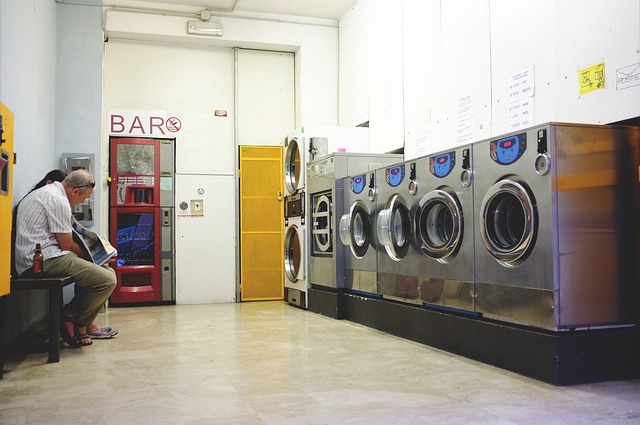
The laundry business is not just a mere trade where clothes are washed and ironed anymore. It is a dynamic business driven by the forces of technology, innovation, customer preferences, and emerging market trends. It is a chance for a shopkeeper managing a traditional laundry shop to become a successful businessman; however, this requires vision, strategic planning, and adaptability laundry businessman.
This all-inclusive guide will take you through the steps, strategies, and practices to convert a simple laundry shop into a thriving laundry business. Let’s begin this journey from shopkeeper to business leader laundry businessman.
1. The Difference Between a Shopkeeper and a Businessman
At the heart of this change is a change in mindset. However, while a shopkeeper usually has a day-to-day operation in handling walk-in customers in a steady stream, the businessman takes a more strategic and scalable approach laundry businessman.
Some key differences are:
- Shopkeeper:
- He pays all the attention to daily jobs.
- Primarily reactive to customer demands.
- He cannot imagine beyond scale or vision.
- Businessman:
- Long-term growth and scalability is a focus.
- Sees opportunities in the market.
- Invests in technology, branding, and customer engagement.
Becoming a businessman from a shopkeeper requires this entrepreneurial mindset and modern tools and techniques to grow the business.
2. Building the Foundation for a Successful Laundry Business
A. Market Research and Understanding Customer Needs

Conduct rigorous market research before scaling your laundry shop into a business. Know your target population, their pain points, and preferences.
Ask yourself:
- What are the most frequent laundry needs in my area?
- Are customers looking for eco-friendly or fast services?
- What are the demographics and income levels of my customers?
Do surveys; analyze your competitors and study the gaps in current market provision, thus designing services unique from others.
B. Setting Goals and Vision
Set goals for your laundry business. These goals can include expanding the customer base, new services, or achieving a target revenue within a given period of time. Set daily operations aligned with your long-term vision for motivation and staying focused.
3. Leveraging Technology to Make Operations More Contemporary
A. Laundry Management Software
Technology is the heart of modern businesses. Use laundry management software, such as Fabklean, to make everyday processes easier. The benefits include:
- Efficient order tracking and inventory management.
- Automated billing and payment systems.
- Better communication with customers by sending them messages about the status of their orders.
B. Automated Equipment
Invest in high-performance washing and drying machines that will save time, energy, and water. Automatic equipment not only saves time but also ensures that the quality of work is constant, which raises customer satisfaction.
C. Online Presence
In the digital world of today, it is important to have an online presence. Build a website or app where customers can book services, track orders, and make payments. Engage with your customers on social media platforms like Instagram, Facebook, and Google My Business.
4. Diversification of Services
A good laundry business can respond to various customers’ needs. Consider diversifying your services into:
A. Dry Cleaning
Provide specialty cleaning for silks, woolens, and linens. Emphasize your capabilities of dealing with exclusive garments.
B. Pickup and Delivery
Convenience will be the ace. Offer pickup and delivery services to help customers spare time and labour. This is big for professionals and households with a lot going on.
C. Subscription Packages
Offer subscription packages for repeat clients, with discounts for monthly or quarterly service. This builds loyalty and provides steady revenue.
D. Specialised Cleaning
Specialise in niche markets by offering cleaning for
- Carpet and rugs
- Curtains and upholstery
- Shoes and handbags.
E. On-Demand Express Services
For customers with urgent needs, provide express services with a higher price point.
5. Prioritizing Customer Retention
Customer retention is more cost-effective than customer acquisition. Building a loyal customer base ensures steady growth.
A. Loyalty Programs
Introduce a points-based loyalty program where customers earn rewards for repeated use of your services. Offer discounts or freebies after a certain number of visits.
B. Personalized Services
Know your customers’ preferences. Keep records of their special requests, such as how they like their clothes folded or preferences for specific detergents.
C. Transparent Communication
Inform customers about their order status through WhatsApp transactional messages or SMS. Ensure that your contact channels are always responsive.
6. Branding and Marketing for Growth

A. Create a Unique Brand Identity
Your laundry business should have a memorable name, logo, and tagline. These aspects help customers identify and trust your brand.
B. Social Media Utilization
Social media sites are great tools for reaching customers. Share content like:
Laundry tips and tricks.
Behind-the-scenes views of your operations.
Customer testimonials.
Promotions and offers.
C. Local Advertising
Run ads in local newspapers, distribute flyers, and use outdoor signage to attract customers in your vicinity.
D. Collaborations and Partnerships
Partner with local businesses, such as gyms, salons, and hotels, on mutually beneficial contracts. Collaborations can bring a steady business flow and help in building your reputation.
7. Sustainable Practices
Incorporate eco-friendly practices to attract environment-conscious customers and save operational costs.
A. Use Eco-Friendly Products
Transition to biodegradable detergents and fabric softeners, which are kind to clothes and the environment as well.
B. Energy and Water Efficiency
Invest in energy-efficient washing machines and water recycling systems to consume fewer resources.
C. Educate Customers
Promote sustainability through educating customers on how to take care of their clothes and prevent waste.
8. Financial Management and Growth Metrics
A successful businessman is rooted in sound financial management. Always keep track of income, expenses, and profits to maintain healthy cash flow.
A. Use Financial Tools
Install accounting software to monitor and record finances, generate invoices, and analyze trends.
B. Establish Revenue Objectives
Establish monthly, quarterly, and annual revenue goals. Monitor progress regularly to see if your business is on course.
C. Growth Plan
Reinvest profits into expanded services, additional equipment, or new locations. Make sure the growth plan complements market needs.
9. Networking and Partnerships
Networking is key to staying updated on industry trends and exploring new opportunities. Join laundry business associations, attend trade shows, and connect with other entrepreneurs to share insights and resources.
A. Strategic Partnerships
Collaborate with real estate developers, apartment complexes, and coworking spaces to secure bulk service contracts.
B. Vendor Relationships
Build strong relationships with suppliers to negotiate better deals on detergents, equipment, and other essentials.
10. Scaling Your Business
Once your laundry business is stable, consider scaling up to reach a wider audience.
A. Open Additional Locations
Expand into new neighborhoods or cities to increase your customer base.
B. Offer Franchising Opportunities
If your brand is well-established, consider franchising to allow others to replicate your business model.
C. Explore Online Platforms
Partner with e-commerce platforms or develop your own app to cater to a broader audience.
11. Embracing Challenges and Innovating
Competition, ever-rising operational costs, and changing customer demands are a few of the challenges in running a laundry business. Treat these problems as more opportunities for innovation and the improvement of services.
A. Monitor Trends
Look out for the latest fads like smart laundry technology or eco-friendliness as an aspect for innovation.
B. Collect Feedback from Customers
Gather feedback frequently to know areas that need improvement and make appropriate adjustments.
Conclusion: A Vision for Success
The journey from shopkeeper to a laundry businessman is one of growth, innovation, and resilience. The potential to become successful and translate that into a thriving business lies in embracing technology, diversifying services, ensuring customer satisfaction through proper targeting and marketing, and scaling strategically. This all happens by adopting proactive thinking and staying customer-centric.
Take the first step today, and watch your laundry business grow into a successful enterprise that reflects ambition and dedication.
